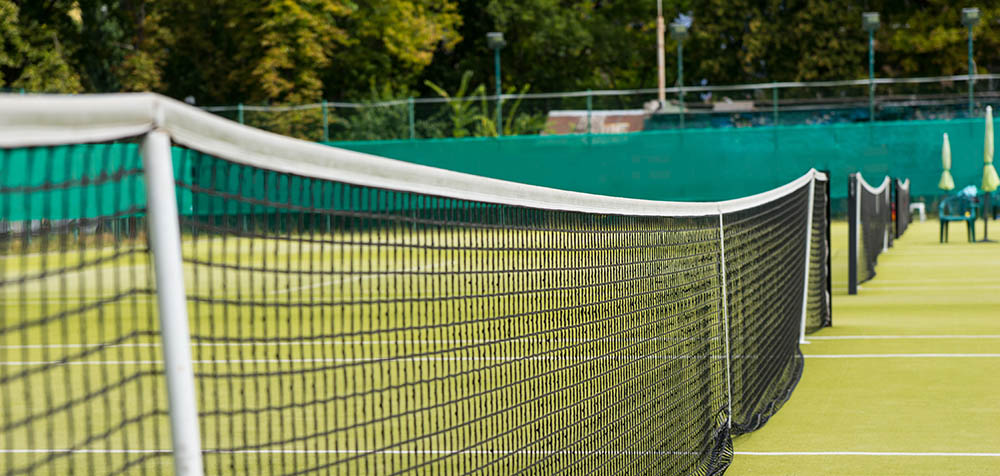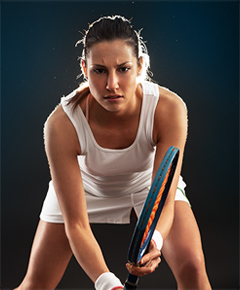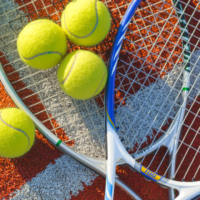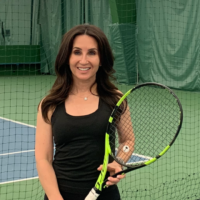The Art of Line Calls
Guest Authored by Michael Emmett, Tennis Professional, Mayfair Lakeshore

The art of line calling can be challenging, difficult and game changing all in the course of a tennis match. The Pros have it easy – they have a multi-million-dollar system (Hawkeye) in place to appease the masses and mostly ‘get it right.’ Hawkeye does not exist during the clay court season in Europe. The club player on the other hand, is all alone and is expected to make line calls on the fly in pressure packed situations, with all the marbles on the line. This can be a gong show if the players are not honest and experienced at the same time.
These Games Matter
I understand that a club match, for some of you, can be just as important as the Wimbledon final for Roger Federer or Serena Williams. Nobody really knows how important or significant that League match is to the average tennis player, who takes the game very seriously. Do we really know how much winning & losing affects these club players? I say we have no idea in some cases.
Here is the adage I ALWAYS go with – a ball that is 99 percent out is 100 percent in. Unless you see the ball CLEARLY out – then you MUST call it in.
Watch the Ball!
I’m on the court for many hours in a month and I see several league matches, ladder matches, and friendlies. I’ve come to the conclusion that line calling is sometimes a guessing game for many club/amateur players. Players see the trajectory and pace of a ball and assume it must be going out when in fact it drops in by a foot.
The line calling at 2.0 to 4.5 level is shocking at times. There is no question that the better players (5.0+) – with more experience – are better line callers and rarely make obvious mistakes. So many times I see a club player call the ball out with their eyes nowhere near the spot where the ball has just landed. Just like most amateurs who don’t watch the ball all the way to the strings – many amateurs call balls when they haven’t actually seen the ball hit the ground. That’s why we see so many mistakes. The ball that is most commonly called out, when it’s sometimes several inches in is the ball on the baseline. This ball, when the player is standing directly above it, at times, is missed horribly.
Topspin Plays a Huge Factor
As pros, we see this one more than any other and it can change the course of a match. Players that hit with heavy topspin are often the recipient of brutal line calls because their balls look like they are going ‘way out’ and then miraculously drop in. These are the balls that club players have a difficult time getting right.
Ask for Help!
It’s confusing to me why – when a challenging line call has presented itself – we don’t ask for help. Positioning on the court is critical. We see with the pros how close some calls actually are. Some balls are in or out literally by an eyelash.
Why is it that we NEVER ask the opponents – who might actually have a better angle; to determine if it was in or out to help us out? Why is that such a foreign concept? Assuming we trust our opponents to be honest, then why not get their opinion on close calls?
I’m playing at the highest level of competitive doubles in the Men’s Toronto league and I would never hesitate to ask my opponents, if I had doubt, or if I thought they had a better sightline to the ball in question.
Closer Does Not Always Mean Better
Often times, the person closest to the landing ball does NOT have the best view to make the call. Sometimes you can be too close and have a terrible view of the falling ball. Lines persons in ATP & WTA tournament matches are never directly on top of the ball. They are stationed along the corresponding line they are expected to call, but they are NEVER within 10 feet of the bouncing ball. Standing on or near where the ball has landed is the worst spot to be – you need space to make these ‘tight’ calls and you will likely get it wrong in these types of situations.
It makes me laugh in some of the league matches when a player will say “you can’t call that ball – you are too far away, it should’ve been your partner that made the call.” Sometimes the player farthest from the ball has the best view to make the call – this isn’t always the case but it happens far more than most realise.
Who is Most Likely to See The Serve?
In a doubles match there are 4 players on the court. Who has the best view of the serve? The returner? The returner’s partner? Both answers are wrong: the server’s partner, the one who is standing closest to the net has the best view in my opinion. Most would answer the returner’s partner as this is the common answer and the most widely believed. Stand in all 4 doubles positions and try it for yourself. It’s especially true when it’s a big server trying to paint the lines. If I’m trying to call Denis Shapovalov’s serve in a doubles match I will have the best opportunity when I’m his partner, not one of his opponents.
Don’t Be Afraid Ask Your Opponents for Help!
In all my time at Mayfair, I’ve never once witnessed the receiving team, in a doubles match, asking the server’s partner how they saw the ball. Asking the opponents how they saw a ball makes for a friendly environment and discussion is never a bad thing. Let the opponents know you are open to feedback and opinion and it can make the match more enjoyable and fair. There is nothing worse in my opinion, when a player screams back to their opponents: “it’s my call, I will call the balls on my side of the net and you call the balls on your side of the net.” This sets the stage for more bad calls, more tension, more attitude and less fun. Ultimately, the player making a call has to make a decision but there is nothing wrong with eliciting comments from the other side of the court. It’s healthy and encourages fair play and really that’s all we all want.
Set the precedent early on – let everyone know you want to get it right and open the discussion on a ball that is extremely close. Put the onus on your opponents – ask them “how did you see that.” You’d be amazed how quickly the tone of the match changes when they recognise you want to get it right and make the environment friendly and not so cut-throat.
Don’t Be Afraid to Respectfully Challenge Your Opponents Calls!
What happens in a match when your opponent makes a questionable call? A ball that you know, without a doubt, is in! You must let them know how you feel and challenge their call – make them aware you feel they made a mistake.
If it’s on a clay court, ask them to show you a mark. Freshly maintained clay courts are easy to get the calls right. Every bounce of the ball on clay leaves a fresh, juicy mark that is evidence of in or out. If they call it out and later realise that they made a mistake the rule says they must give you the point. In casual play the common course of action is to play a ‘let.’ This is a sporting gesture and a good compromise, but it is not the correct way to handle the situation.
Make the Game Fair
What happens if you’re playing doubles and your partner makes a mistake? Do you over-rule them & possibly embarrass your partner in front of the other players? The answer is a resounding yes – just do it discreetly and calmly and without histrionics. It has to be done. It is blatant cheating if you don’t. But be 100 percent sure you are correct. Make sure there is no doubt whatsoever before you make this call. In the long run you’ll play better for it and the tennis gods will return you a favour in a critical juncture of the match. I know this with certainty based on past history. Over-ruling your partner can be the turning point in the match – either in a good way or a catastrophic way. Make sure you convince your partner that you are as sure as the sky is blue and make them understand you had a better angle to make such an important call.
Be Open for Debate and Discussion
Line calling in club tennis is an often over looked part of the match. If all goes well it’s never talked about, but if things go badly then it might be the talk of the club for days to come. Don’t be that person who gets a bad reputation for poor line calling. Look, the ball is travelling at times in excess of 100/mph and the human eye is not equipped to make these important calls in a timely fashion with so little to choose from in some instances. This is an impossible task to say the least.
My only suggestion is be open to debate and discussion. Let your opponents know you will not be confrontational and arrogant when it comes to line calling. I believe if you follow my advice the matches will be just as competitive & hard fought but the opponents will feel better about a ‘close call’ if you bring them into the process and suggest to them they can offer up an opinion.
Remember to Have Fun!
Tennis is a great game from so many different levels – don’t let a few tricky line calls ruin the vibe and create an unpleasant atmosphere throughout the duration of the match. Once again, always give the benefit of the doubt on EVERY line call and you’ll never be accused of cheating. The match will be more enjoyable from all accounts and this is really what it is all about.
If you’d like to learn more about tennis at Mayfair Clubs, contact lakeshoretennis@mayfairclubs.com.
Recent Facebook Posts
Newsletter
Sign up
Join our Mayfair Newsletter for the latest member news, events, contests, promotions and blogs. You may unsubscribe at anytime by clicking the "unsubscribe" link at the bottom of all newsletter emails.
 Lakeshore (416) 466-3777
801 Lake Shore Blvd E Toronto, ON Lakeshore and DVPs
Lakeshore (416) 466-3777
801 Lake Shore Blvd E Toronto, ON Lakeshore and DVPs
 West (416) 638-1010
3855 Chesswood Dr Toronto, ON Sheppard and Dufferin
West (416) 638-1010
3855 Chesswood Dr Toronto, ON Sheppard and Dufferin
 Parkway (905) 475-0350
50 Steelcase Rd. E. Toronto, ON Woodbine and Steeles
Parkway (905) 475-0350
50 Steelcase Rd. E. Toronto, ON Woodbine and Steeles
 East (905) 475-8833
160 Esna Park Dr Markham, ON Denison and Victoria Park
East (905) 475-8833
160 Esna Park Dr Markham, ON Denison and Victoria Park




































